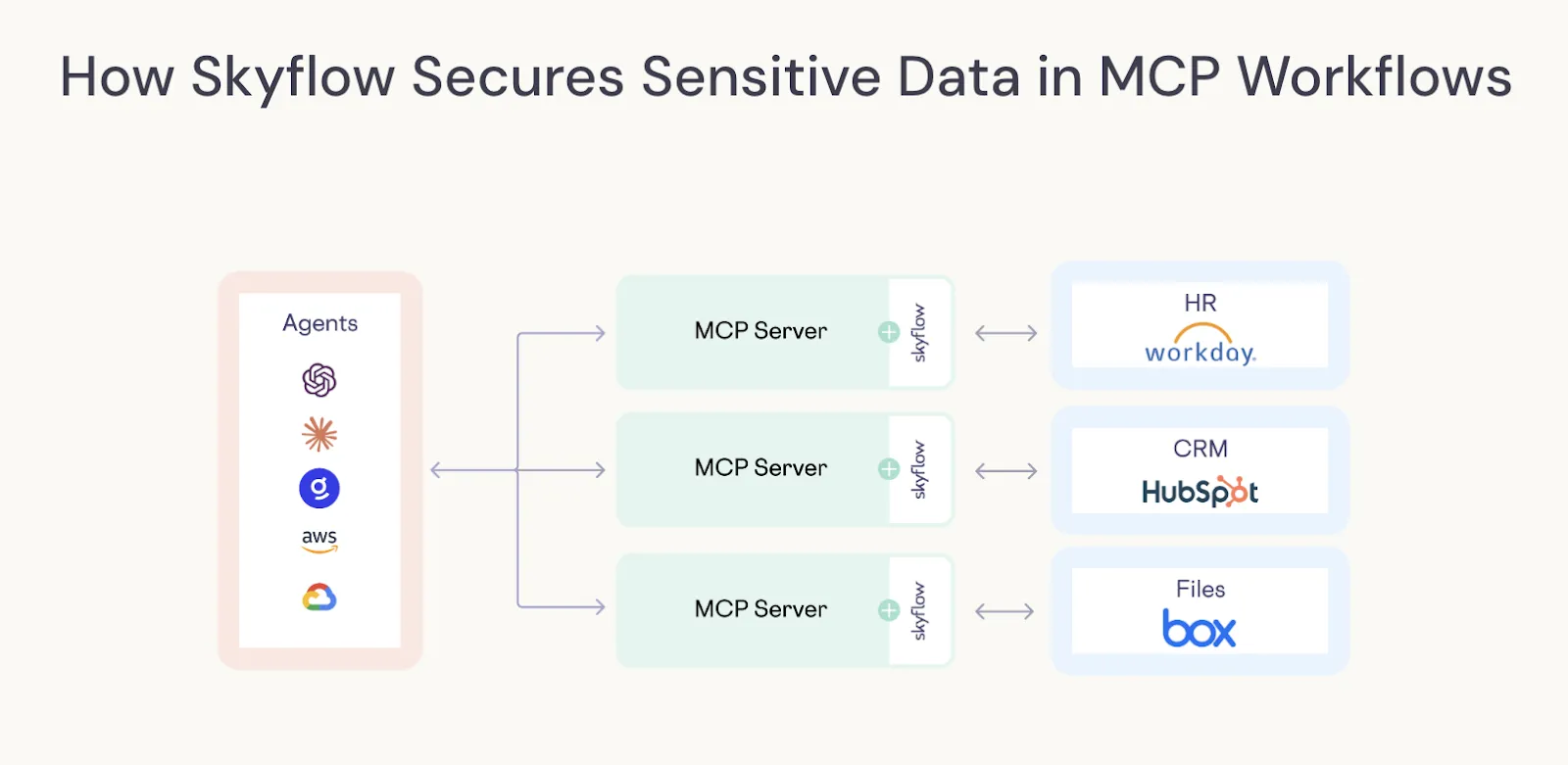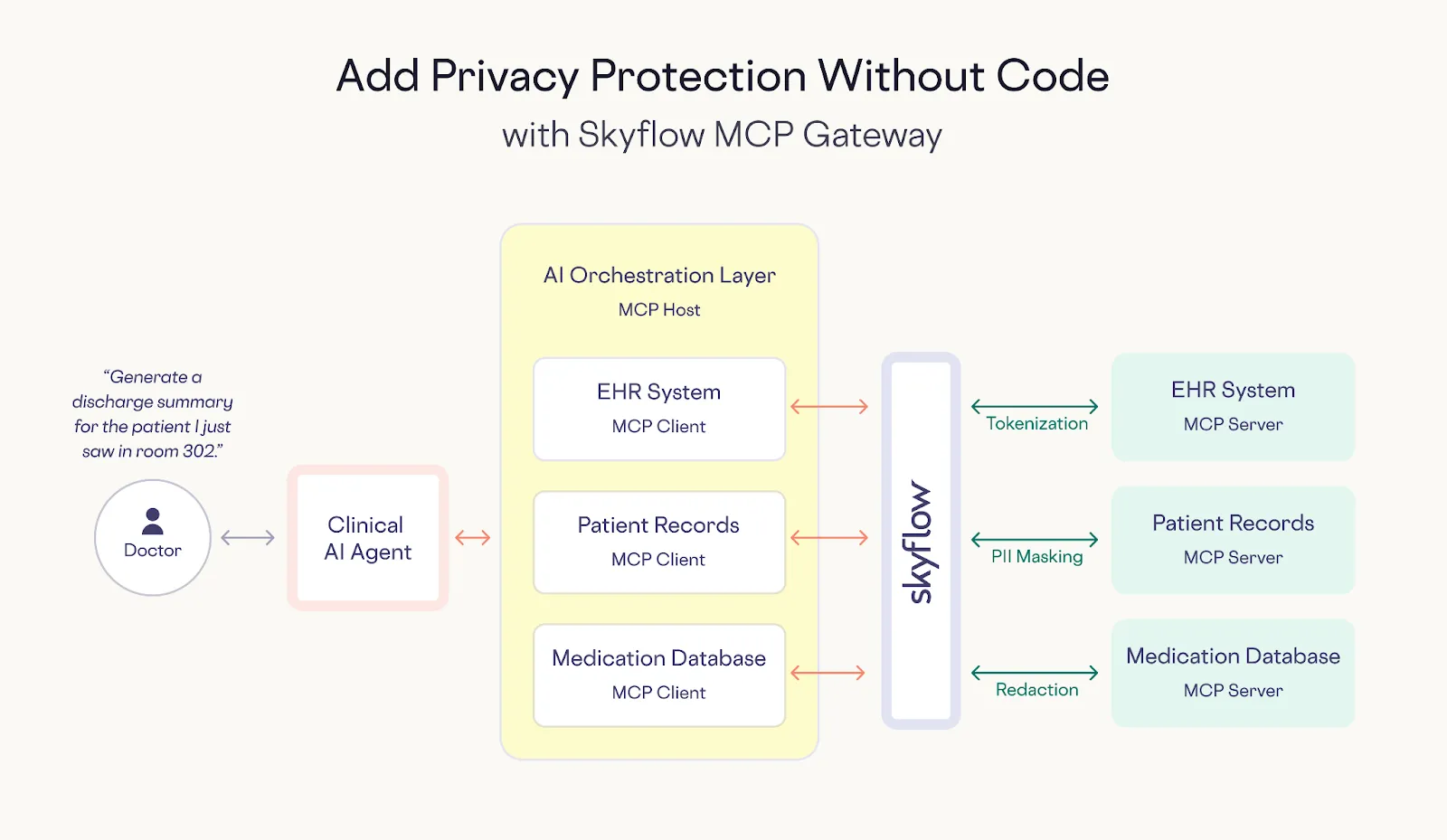Building Secure AI Agent Architecture with Model Context Protocol
Every enterprise faces the same AI dilemma: agents need data access to be valuable, but every connection multiplies compliance risk. This fundamental tension is reshaping how engineering leaders are thinking about AI architecture, and Anthropic's Model Context Protocol (MCP) sits right in the middle of it.
Introduced in November 2024, MCP is quickly becoming the universal adapter for the agentic AI world. MCP solves the classic NxM integration problem: Instead of every AI model needing custom code for each tool, there's now a standard way to connect to any external system. With MCP, developers can now build secure, two-way connections between AI agents and real-world tools like APIs, databases, and dev platforms, enabling assistants that do more than just chat.
In 2025, MCP evolved significantly with the rise of remote MCP servers, shifting from local, developer-run processes to web-accessible services with built-in auth flows and permissioning. This change mirrors the leap from desktop to cloud software, unlocking scalability and ease of use for teams and enterprises. Major players like Atlassian, GitHub, and Cloudflare have launched their own remote MCP servers, and the protocol itself has matured with updates like Streamable HTTP replacing the limitations of SSE. The ecosystem is booming, with thousands of registered servers listed in directories like PulseMCP, fueling a shift from passive LLMs to true agents that can interact with and act on live enterprise data.
But as MCP servers open up powerful new ways for agents to interact with live data, they also introduce serious privacy and security challenges. These agents often retrieve sensitive information such as customer records, financial data, health details and inject it into LLM prompts where traditional access controls don't apply. Without the right guardrails, there's real risk of data leakage, over-permissioned access, and compliance violations. That's why privacy-preserving infrastructure becomes essential, offering the ability to unlock the power of MCP servers while making sure that the data flowing through MCP workflows remains protected end-to-end.
Where MCP Servers Are Being Used
MCP servers are emerging wherever AI agents need secure access to real-world data. Enterprises across retail, financial services, healthcare, travel and hospitality are deploying these connections:
- In healthcare, to retrieve and summarize patient records while ensuring PHI is protected.
- In financial services, to power advisor assistants that access portfolios and research with strict access controls.
- In retail, to personalize service by pulling order history and product data on demand.
- In B2B SaaS, to enable copilots that fetch tenant-specific data while preserving isolation and compliance.
- Even in enterprise software, to connect LLMs with CRMs and support tools like Salesforce or Zendesk.
As adoption grows, one thing is clear: MCP servers make agentic AI powerful and it becomes critical to have privacy layers make it safe.
Key Privacy Risks with MCP Servers
As powerful as MCP servers are, they introduce real privacy and security concerns—especially when agents interact with sensitive data like PII, PHI, or financial information. Common risks include:
- PII and PHI leakage through prompts or model responses
- Prompt injection attacks that bypass access controls
- Inference-time data exposure or logging of protected data
- Over-permissive access to source systems
- Credentials being leaked in prompts
- Violations of GDPR, HIPAA, DPDP due to unredacted data
- Cross-border data transfers without proper controls
- Lack of audit trails and tracing across agent interactions
Without the right guardrails, even well-intentioned agents can become data liability engines. For enterprises, these aren't just theoretical concerns. A single agent prompt containing unprotected PII can trigger regulatory investigations costing millions in fines and remediation.
Unlike traditional DLP tools that block data entirely, Skyflow's approach leverages polymorphic data protection to transform sensitive information in real-time: masking, tokenizing, or rehydrating fields contextually based on policy and user permissions. This enables organizations to maintain security and compliance while keeping AI agents fully functional.
How Skyflow Secures the MCP Ecosystem
These privacy and security challenges require purpose-built solutions that can protect sensitive data without breaking the powerful workflows that make MCP servers so valuable.

Skyflow’s MCP Data Protection Layer is purpose-built for SaaS platforms and enterprises integrating MCP in agentic workflows. Whether you're building a custom MCP server or integrating with frameworks like LangChain or GitHub Copilot, Skyflow can protect sensitive data through every step of your workflows.
Skyflow offers two privacy-preserving products purpose-built for securing data across agentic and MCP-based workflows:
- Skyflow MCP Gateway: A proxy layer (which can be integrated into existing proxy servers) that sits between MCP servers or agents and backend data sources, enforcing field-level privacy policies without requiring application changes.
- Skyflow MCP Server SDK: An embeddable library that developers can use to build privacy controls directly into MCP server implementations and agentic applications.
Key enterprise-grade capabilities include:
- Use case aware de-identification of sensitive fields before reaching the model
- Entity-preserving transformations so agents can reason over obfuscated data
- Contextual re-identification only for authorized users and responses
- Full audit logging and access visibility to meet compliance and governance needs
- Secure memory persistence to ensure long-term agent memory doesn't store unprotected PII
By securing both the data ingress and egress paths, Skyflow enables SaaS platforms and developers to safely adopt MCP-based workflows. With Skyflow, privacy becomes a core enabler of trustworthy, scalable AI.
As MCP becomes the standard for connecting AI agents to real-world data, companies need privacy infrastructure that can scale with it.
Skyflow offers flexible integration approaches depending on your development access and requirements:
- If you're working with an existing SaaS app that uses agents and an embedded MCP server (like Glean) and you can't modify the tool, you can insert the Skyflow MCP Gateway as a proxy between the tool and the data source (e.g., Salesforce), allowing all traffic to flow through Skyflow where data protection and privacy policies are enforced.
- If you do have access to the tool's code or plugin framework, you can use the Skyflow MCP Server SDK to wrap existing functions, intercepting inputs and outputs to apply redaction and enforce policies.
- If you're building a new MCP server or connector from scratch, you can embed the SDK directly to enforce privacy by design with integrated access control, redaction, and audit logging.
MCP Security Use Case: Insurance Customer Support
A customer contacts their insurance provider through a customer support app: the customer's recent claim for a medical visit was rejected, and they’re unsure how to proceed with bill payment. This message is routed to an internal AI-powered support agent.
The internal agent, built on a company-wide AI orchestration layer, uses tools (MCP servers) that connect to multiple backend systems. To answer accurately, the assistant needs to:
- Verify the customer’s identity and policy details from the CRM
- Pull insurance eligibility and plan coverage from the policy database
- Check the claims processing system to confirm whether the claim was submitted or denied and why
These backend calls are routed through the MCP servers, which use the Skyflow MCP Server SDK to enforce privacy controls. For example:
- The CRM call retrieves a tokenized version of the customer's name and member ID, ensuring only necessary identifiers are used in the LLM prompt.
- Insurance and claim details are fetched, but PII like date of birth and address are masked.
The assistant receives just enough structured data to reason through the rejection—the claim was denied due to a missing document—and to propose a draft response.

Before this response is sent to the customer, the internal agent enters a "Plan" mode, sending a proposed message and rationale to a human support rep for approval.
Once approved, the message is relayed to the customer: an explanation of the claim rejection and instructions for resubmission.
Even if the insurance agency had already built this AI agent using existing MCP servers without native privacy support, they could instead use Skyflow MCP Gateway. This gateway wraps outbound queries, enforcing redaction, masking, and tokenization before any sensitive data reaches the agent or underlying model.
With Skyflow, the insurance company protects sensitive health and identity data across CRM, policy, and claims systems while enabling rich, AI-powered support interactions that are both safe and compliant.
MCP Security Use Case: Healthcare Clinical Assistant
Suppose a doctor uses an AI agent to summarize patient visits. When the doctor completes a patient visit, they might tell the agent, "Generate a discharge summary for the patient I just saw in room 302, including their treatment history, medications, and follow-up instructions."
Without Skyflow's privacy protections, the agent could use the hospital's MCP server to directly query the Electronic Health Record (EHR) system, retrieving the patient's complete record, including full name, social security number, address, and detailed medical history. This sensitive PHI would flow directly into the LLM prompt, creating compliance risks and potential data exposure.
But with Skyflow, the agent only accesses the minimum data needed for the task. When the agent uses the hospital's MCP server, the agent still makes the query for patient data, but the MCP server uses Skyflow MCP Server SDK to apply privacy policies to the response:
- Replacing the patient name and social security number with contextual tokens
- Tokenizing the home address while preserving the city and state for relevant care coordination
- Maintaining medical codes, dates, and clinical data needed for the summary
And if the hospital's MCP server was built without privacy protections in mind, the agent could wrap the request to the server with Skyflow MCP Gateway to respect privacy at the agent-level.
Either way, the doctor receives a complete, clinically accurate discharge summary that includes all necessary medical information, but the underlying AI interaction was performed with protected information and maintains HIPAA compliance.

Looking Ahead
As MCP servers become more widespread, privacy protection is shifting from "nice to have" to "must have." Companies that implement privacy by architecture now will have a real advantage as they can deploy AI agents more freely across sensitive data without compliance headaches or security incidents. This approach makes secure and compliant enterprise AI deployment architecturally possible.
The combination of powerful AI agents and strong privacy controls is becoming the new standard. With tools like Skyflow MCP Gateway and Skyflow MCP Server SDK, privacy stops being a roadblock and starts being what makes AI deployment possible in the first place.
The bottom line: if you want to use AI agents with real business data, privacy protection isn't optional anymore – it's what makes everything else possible.
Ready to Secure Your MCP Implementation?
For MCP server developers: Use Skyflow MCP Server SDK to ensure data fetched from your connected systems never exposes sensitive information.
For teams using existing MCP servers: Deploy Skyflow MCP Gateway to protect all data flowing between agents and backend systems without code changes.
Schedule a demo to learn more.

